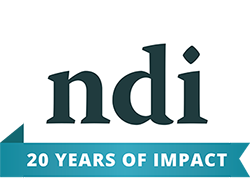By Elizabeth Jennings, Deputy Director, National Disability Institute
For many people – far too many people – the COVID-19 pandemic has resulted in job loss and financial crisis. I am fortunate to have kept my job. But, 2020 offered a different blow; I was diagnosed with a rare (but treatable) cancer. A student of positive psychology, I knew how to prepare myself mentally. What I wasn’t prepared for was the extra costs of having a chronic illness.
You’d think that I would understand that any chronic illness or disability can lead to extra costs. I work for National Disability Institute (NDI) and we wrote an entire paper on the extra costs of living with a disability! No… I thought my years of steady employment, health insurance, short-term disability insurance and savings would protect me. Boy, was I wrong.
Cancer is expensive.
It’s not just the medical costs. It’s all the extras – over the counter drugs to manage side effects, doggy day care because I am too fatigued to manage my dog all day every day, gas for getting to my many, many appointments, food costs and grocery delivery, extra cleaning products…. not to mention the time out of work. It adds up quickly to tens of thousands of dollars.
At first, I wanted to put my head in the sand and pretend that these new costs didn’t exist, but that only ever makes matters worse. So instead, I used what I have learned. Working at National Disability Institute, I have benefitted from reading and using many financial education courses and tools that helped me think through how to address the increases in costs and decrease in income. I thought about my current financial life, the way I pay my bills and what was financially important to me. I asked myself hard questions: What will happen when I am not receiving a paycheck and instead have only a fraction of my pay through short-term disability insurance? Are there costs that I can decrease now that my income will be less? Will I be able to manage my finances when I am in the hospital and recuperating afterwards?
I sat down and reviewed my budget to understand the impact of these new costs. I reduced any costs I could such as lowering my phone plan and cancelling unnecessary subscriptions. I adjusted my payroll to increase pay to my checking account and reduce pay to my savings. I put more aside in a Flexible Savings Account so I could get the pre-tax benefit. I consolidated debt to reduce the interest rates on my student loan and mortgage and lower my total monthly expenses. I decided to use savings to pre-pay monthly bills so that I don’t overdraft accounts the months that I am not working. And I identified a support, a family member, to check my mail for any urgent financial matters.
This month, National Financial Capability Month, as I reflect on all of the ways in which I am financially surviving this health crisis, I recognize that I am very fortunate. I have a treatable cancer, good health insurance, short-term disability insurance, savings and a supportive workplace. And yet, cancer is a considerable financial hit.
The financial tools NDI provides have helped me a great deal. You, too, can connect to our tools or use this free financial education platform to build your financial know-how. You can also check out our Financial Resilience Center to connect to resources to manage the impact of COVID-19 and other life events on your financial life. If you need financial assistance, there are several groups that provide grants and/or co-pay assistance to cancer patients. They’re listed below.
Just as you can’t fully plan for the news that you have a chronic illness, you can’t fully plan for all of the costs. I hope some of the strategies I shared will help you manage the extra costs you you may be facing as the result of a crisis. I’d love to hear your strategies for managing extra costs. Please share them in the comments.
BMT InfoNet
Financial assistance for post-transplant related non-medical bills, utilities, food, gas, etc.
https://www.bmtinfonet.org/patient-assistance-fund-request-form
Must apply through social worker
The Bone Marrow & Cancer Foundation
Small grants, medical fundraising, etc.
1-800-365-1336
www.bonemarrow.org
CancerCare Foundation
Counseling, support groups, educational information and assistance with treatment related cost.
1-800-813-4673
www.cancercare.org/financial
Co-Pay Assistance Programs:
CancerCare Co-Pay Assistance Foundation
866-552-6729
information@cancercarecopay.org
www.cancercare.org
Financial Assistance Resources:
American Cancer Society
Educational information, lodging, transportation, support, etc.
1-800-277-2345
www.cancer.org
HealthWell Foundation
Financial assistance: Prescription copays, Health insurance premiums, deductibles, coinsurance, pediatric treatment costs, and travel costs
1-800-675-8416
www.healthwellfoundation.org
Help Hope Live Medical Fundraising
Assistance with fundraising and support
1-800-642-8399
www.helphopelive.org
Leukemia & Lymphoma Society
Co-Pay Assistance Program
877-557-2672
www.lls.org
Leukemia & Lymphoma Society
Educational information, grants, medical fundraising, support, etc.
1-800-955-4572
www.lls.org/support
National Organization for Rare Disorders
1-800-999-7141
www.rarediseases.org
Patient Access Network Foundation (PAN)
866-316-7263
www.panfoundation.org
Patient Advocate Foundation
866-512-3861
www.patientadvocate.org
Patient Services Incorporated
1-800-366-7741
www.patientservicesinc.org
Triage Cancer
Legal and financial education
424-258-4628
www.triagecancer.org/financial
Zaching Against Cancer
Prescription assistance, complimentary therapies, utility bill assistance, transportation, child care, co-payments, house cleaning, meals and etc.
www.zachingagainstcancer.org

Elizabeth Jennings, Deputy Director
Elizabeth Jennings, M.A.P.P., is the Deputy Director of National Disability Institute. Ms. Jennings has 20 years of experience managing
grants and contracts and providing training and technical assistance to a range of service providers as well as youth and adults with disabilities and their informal supports. She is skilled in multi-modal training and technical assistance with an eye on customizing materials and approach to meet the learner where they are towards increased knowledge gains and capacity building.
Ms. Jennings is recognized nationally for her knowledge on financial literacy education activities and strategies that improve the economic advancement of people with disabilities and the interplay of those strategies with Social Security disability benefits, including applicable work incentives and other SSA tools to mitigate barriers to full participation.
Ms. Jennings earned her Master of Applied Positive Psychology from the University of Pennsylvania and is crafting new material to address the internal barriers that job seekers face and positive interventions that support both service providers and their customers to improve the well-being of the disability community at-large.



